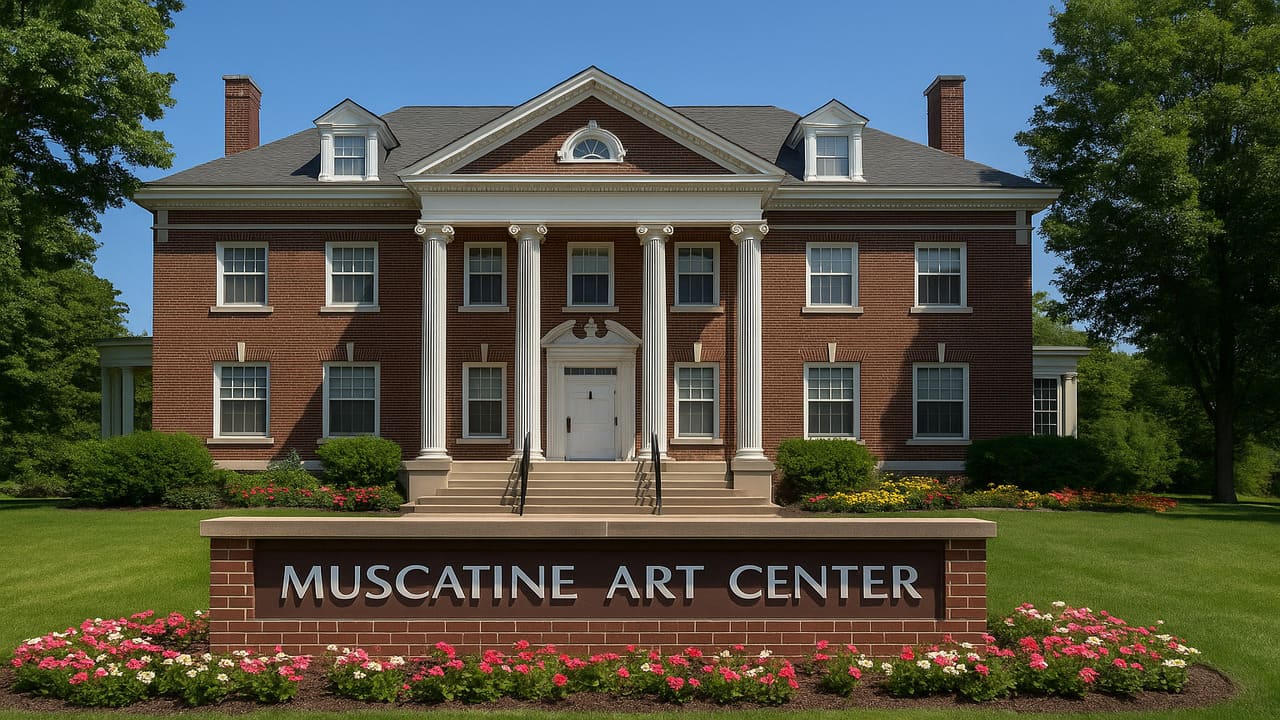
Meet Muscatine – The Muscatine Art Center stands as one of Iowa’s most cherished cultural institutions, preserving both local history and world-class art. Originally the home of Laura Musser McColm, a member of a prominent Muscatine family, the historic 1908 Georgian Revival mansion became the foundation for the art center. In 1965, the Musser family gifted the property to the city, establishing a lasting legacy of art appreciation and cultural education.
Since then, the Muscatine Art Center has expanded its role beyond being a repository of fine art. It has become a vibrant space where the community interacts with history, creativity, and culture. By blending elements of heritage with contemporary exhibitions, the center has successfully created a bridge between the past and the present. This combination makes it a destination not only for art enthusiasts but also for those interested in exploring the character of Muscatine.
The Muscatine Art Center boasts an impressive permanent collection that includes American art from the 19th and 20th centuries, with works by renowned artists such as Grant Wood, Marvin Cone, and Thomas Hart Benton. These pieces reflect both regional artistic traditions and broader national movements, allowing visitors to see how local voices contributed to the American art narrative.
In addition to paintings, the center also features decorative arts, photographs, prints, and textiles. Of particular note is the Musser Mansion itself, which houses a significant portion of the collection and provides an authentic setting to experience the works. Visitors can explore not only the art but also the preserved rooms of the mansion, which offer insight into early 20th-century life in Muscatine. Special rotating exhibitions further ensure that every visit feels fresh, whether showcasing local artists or traveling shows with international significance.
Also Read : Saulsbury Bridge Recreation Area: A Perfect Riverside Camping Escape
Education has always been a central mission of the Muscatine Art Center. The center hosts a variety of programs designed to engage audiences of all ages, from young children experiencing art for the first time to adults seeking to deepen their knowledge. Weekly art classes, hands-on workshops, and summer camps help foster creativity in the younger generation, while lectures and gallery talks provide context and enrichment for adult audiences.
The center’s outreach goes beyond its physical walls. Collaborations with local schools ensure that students have opportunities to learn about art history and practice creative skills. Public programs often address themes that resonate with the Muscatine community, creating dialogues that connect art to everyday life. By making art accessible and interactive, the Muscatine Art Center reinforces its role as an inclusive cultural hub.
The value of the Muscatine Art Center extends far beyond its collections and educational programs. For the community, it represents pride in heritage, a commitment to creativity, and a space for dialogue across generations. Visitors from outside Muscatine often remark on the unexpected richness of the art center, considering the size of the city. This contrast underscores the importance of local investment in cultural resources.
Moreover, the center contributes to the broader cultural economy. By attracting tourists, hosting events, and supporting artists, it helps generate vitality in downtown Muscatine. Cultural institutions like this play a subtle but powerful role in shaping a city’s identity, and in Muscatine’s case, the Art Center embodies the balance between honoring tradition and embracing new ideas.
Read More : UI Student Body Urges Parliament to Probe Alleged Coup
Instead of ending with a conclusion, it is valuable to look toward the future. The Muscatine Art Center is poised to grow as both an artistic and community anchor. As technology continues to reshape how people engage with culture, the center may expand its digital offerings, making collections more accessible online and broadening its reach beyond Iowa. Virtual exhibitions, digital archives, and online learning platforms could ensure that the center remains relevant in a rapidly changing world.
At the same time, the physical experience of visiting the Muscatine Art Center will remain irreplaceable. Walking through the halls of the Musser Mansion, surrounded by art and history, provides an atmosphere that cannot be replicated virtually. The challenge and opportunity for the future lie in balancing digital accessibility with the authenticity of in-person experiences. As Muscatine continues to evolve, the Art Center will remain a beacon of creativity, history, and cultural pride guiding the community into the next chapter of its artistic journey.